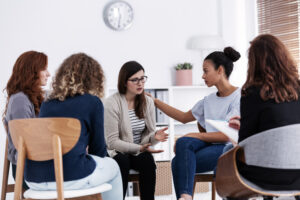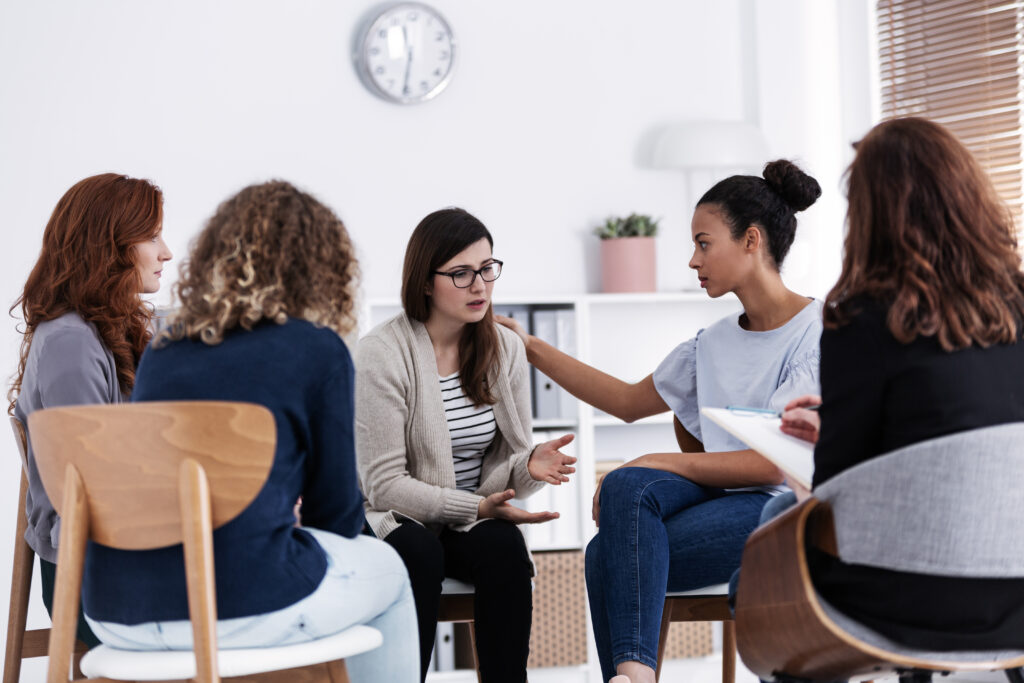 Learning about eating disorders is the first step on the journey to recovery for those who are struggling and is also crucial for loved ones wanting to provide support.
Learning about eating disorders is the first step on the journey to recovery for those who are struggling and is also crucial for loved ones wanting to provide support.
To help arm you with reliable resources, The Renfrew Center has gathered some of our favorite body image, self-esteem, self-help, and eating disorder research websites and organized them alphabetically.
- About Face
About-Face arms girls with the knowledge and tools they need to fight back against a culture that diminishes and disempowers them. - Academy for Eating Disorders
Founded in 1993, the Academy for Eating Disorders (AED) helps physicians, psychiatrists, psychologists, nutritionists, academic researchers, students and experts through lived experience connect and collaborate with each other and keep abreast of recent developments in eating disorders research. - Adultish: The Body Image Book for Life By Dr. Charlotte Markey (Book)
Discover the ultimate guide to taking on adulthood with body confidence. In a world where body satisfaction plummets during adolescence, and a global pandemic and social media frenzy have created extra pressure, Adultish is a survival kit for young adults. This all-inclusive book provides evidence-based information on everything from social media and sex to mental health and nutrition. Packed with valuable features like Q&As, myth-busting, real-life stories, and expert advice, it is a go-to source for discovering the importance of self-acceptance and embarking on a journey towards loving the skin you’re in. - Alliance for Eating Disorders Awareness
The National Alliance for Eating Disorders is the leading nonprofit organization dedicated to the outreach, education, early intervention, support, and advocacy for all eating disorders. - Anti-Diet: Reclaim Your Time, Money, Well-Being and Happiness Through Intuitive Eating by Christy Harrison (Book)
In Anti-Diet, Christy Harrison takes on diet culture and the multi-billion-dollar industries that profit from it, exposing all the ways it robs people of their time, money, health, and happiness. It will turn what you think you know about health and wellness upside down, as Harrison explores the history of diet culture, how it’s infiltrated the health and wellness world, how to recognize it in all its sneaky forms, and how letting go of efforts to lose weight or eat “perfectly” actually helps to improve people’s health—no matter their size. - Association for Size Diversity and Health
The Association for Size Diversity and Health is a national nonprofit that is committed to the practice of the Health at Every Size® principles. - Association for Women in Psychology
The Association for Women in Psychology (AWP) is an interdisciplinary organization that attends to issues and concerns at the intersections of feminism and psychology. - Body Image Movement
Founded in 2012, the Body Image Movement is on a mission to end the global body-hating epidemic by inspiring people to embrace their bodies through documentaries, books, online programs, speaking and educational resources. - Chats in the Living Room
Chats in the Living Room offers weekly support opportunities hosted by experts in the field of eating disorders. These spaces are open to both clients and professionals. - Crisis Text Line
Crisis Text Line provides free, 24/7, high-quality text-based mental health support and crisis intervention by empowering a community of trained volunteers to support people in their moments of need. - Diabulimia Helpline
Founded in 2009, the Diabulimia Helpline is the world’s first 501(c)3 non-profit organization dedicated to education, support, and advocacy for people with diabetes and eating disorders, and their loved ones. - Eating Disorder Hope
Eating Disorder Hope’s mission is to offer hope, information, and resources to individual eating disorder sufferers, their family members, and treatment providers. The organization began with the help and advice of colleagues, professors, and other organizations specializing in eating disorders. - Eating Disorders Coalition for Research, Policy and Action
A coalition of eating disorder groups, of which Renfrew is a founding member, that advances the federal recognition of eating disorders as a public health priority. - Eating Disorders Don’t Discriminate: Stories of Illness, Hope and Recovery from Diverse Voices Edited by Chukwuemeka Nwuba and Bailey Spinn (Book)
Every story of living with an eating disorder is unique. Eating Disorders Don’t Discriminate brings together 31 of them, each tackling the stereotypes and misconceptions about what eating disorders look like and who they impact. Athletes, activists, directors, models, health professionals, and more share their experiences of eating disorders, including binge eating disorder, bulimia nervosa, anorexia nervosa, ARFID and OSFED, and highlight the complexities of how race, gender, culture and social media can influence our experiences of body and food. Compiled by Dr. Chuks Nwuba, who has cared for some of the UK’s most unwell eating disorder patients, and Bailey Spinn, TikToker and eating disorder advocate, this stirring anthology is one of hope and encouragement for anyone who feels misunderstood and underrepresented. - ED Matters Podcast
Kathy Cortese, LCSW, ACSW, CEDS, has conversations with experts in the filed of eating disorders. These conversations are meant for people looking to recover, people in recovery, their loved ones, and the people who treat them. All topics and diagnoses are covered (anorexia, bulimia, binge eating disorder, OSFED, etc.) with an overall message that recovery is possible. - Fearing the Black Body: The Racial Origins of Fat Phobia by Sabrina Strings (Book)
Author Sabrina Strings argues that the contemporary ideal of slenderness is, at its very core, racialized and racist. Indeed, it was not until the early twentieth century, when racialized attitudes against fatness were already entrenched in the culture, that the medical establishment began its crusade against obesity. An important and original work, Fearing the Black Body argues convincingly that fat phobia isn’t about health at all, but rather a means of using the body to validate race, class, and gender prejudice. - Families Empowered and Supporting Treatment for Eating Disorders (F.E.A.S.T)
F.E.A.S.T. offers targeted resources to enhance caregiver skills, build caregiver knowledge, and offer both caregiver support and community. - Food Psych Podcast by Christy Harrison
Launched in 2013, this podcast challenges diet culture in all its forms-including the restrictive behaviors that often masquerade as wellness and fitness. In weekly episodes, Christy answers listener questions and talks with guests about making peace with food, healing from disordered eating, (re)learning intuitive eating, challenging harmful beliefs about wellness- and more-all from a body-positive, anti-diet perspective. - Intuitive Eating: A Revolutionary Program that Works by Evelyn Tribole and Elyse Resch (Book)
The classic bestseller about rejecting diet mentality, now revised and updated for the intuitive eaters of today. Since it was first published in 1995, Intuitive Eating has become the go-to book on rebuilding a healthy body image and making peace with food. This revised edition is entirely updated throughout including new material on diet culture, weight stigma, and baby-led weaning. These expansions will help readers properly integrate intuitive eating into their daily lives and make peace with food. - Medical Students for Size Inclusivity
A community of medical students raising awareness about the harms of weight discrimination in the healthcare system. - My Secret Life with an Eating Disorder Podcast
This podcast is hosted by Maureen Kritzer-Lange, MSW, LCSW, a psychoanalyst specializing in eating disorders (The Queen of Self Esteem and creator of the Don’t Trust the Mirror Movement). Maureen shares her personal story of her struggles with an eating disorder growing up – she lived it, she breathed it and now she has the courage to talk about it. - Multi-Service Eating Disorders Association
MEDA provides education about eating disorders and their underlying causes to develop a compassionate community that promotes hopefulness and supports healing. They offer a variety of services to support individuals and loved ones through the various stages of their journey. - National Association of Anorexia and Associated Disorders (ANAD)
ANAD is the leading nonprofit in the U.S. that provides free, peer support services to anyone struggling with an eating disorder, regardless of age, race, gender identity, sexual orientation, or background. - National Eating Disorders Association
The National Eating Disorders Association (NEDA) is the largest nonprofit organization dedicated to supporting individuals and families affected by eating disorders. NEDA supports individuals and families affected by eating disorders, and serves as a catalyst for prevention, cures and access to quality care. - National Institute of Mental Health
A federal government website that details information about eating disorders and has links to other information on mental health issues and grant opportunities. - Project Heal
Project Heal exists as a resource for all people struggling with disordered eating in the United States. - Recovery Warriors
Recovery Warriors is dedicated to boosting the emotional intelligence and resilience of people struggling with depression, anxiety and eating disorders. - The Body Positive
The Body Positive was founded in 1996 because of the shared passion to create a lively, healing community that offers freedom from suffocating societal messages that keep people in a perpetual struggle with their bodies. - The Jed Foundation
The Jed Foundation (JED) is a nonprofit that protects emotional health and prevents suicide for our nation’s teens and young adults, giving them the skills and support they need to thrive today…and tomorrow. - The Joy Project
The Joy Project is a non-profit organization that aims to empower people with eating disorders by providing real-world, workable strategies and tools for recovery. They provide support, conduct research, and represent the survivor voice in the greater eating disorder advocacy community. - The Renfrew Center
The Renfrew Center has been the pioneer in the treatment of eating disorders since 1985, with a core focus of empowering women to change their lives. As the nation’s first residential eating disorder facility, Renfrew has helped more than 100,000 adolescent girls, women, transgender, and non-binary individuals move towards recovery by providing them with the tools they need to succeed in recovery and in life. - Sick Enough: A Guide to the Medical Complications of Eating Disorders by Dr. Jennifer L. Gaudiani (Book)
Patients with eating disorders frequently feel that they aren’t “sick enough” to merit treatment, despite medical problems that are both measurable and unmeasurable. They may struggle to accept rest, nutrition, and a team to help them move towards recovery. Sick Enough offers patients, their families, and clinicians a comprehensive, accessible review of the medical issues that arise from eating disorders by bringing relatable case presentations and a scientifically sound, engaging style to the topic. Using metaphor and patient-centered language, Dr. Gaudiani aims to improve medical diagnosis and treatment, motivate recovery, and validate the lived experiences of individuals of all body shapes and sizes, while firmly rejecting dieting culture.
Conclusion
Recovery from an eating disorder is a challenging but achievable journey and having access to reliable information and support is essential for both those struggling and their loved ones. The resources we’ve highlighted offer a wealth of knowledge, tools, and community support to guide you along the way. Whether you’re seeking professional guidance, personal empowerment, or ways to support someone you care about, these organizations, books, podcasts and programs provide valuable starting points. Remember, recovery is possible, and you don’t have to navigate it alone.
Have a resource to share with us? Contact [email protected] to let us know!



